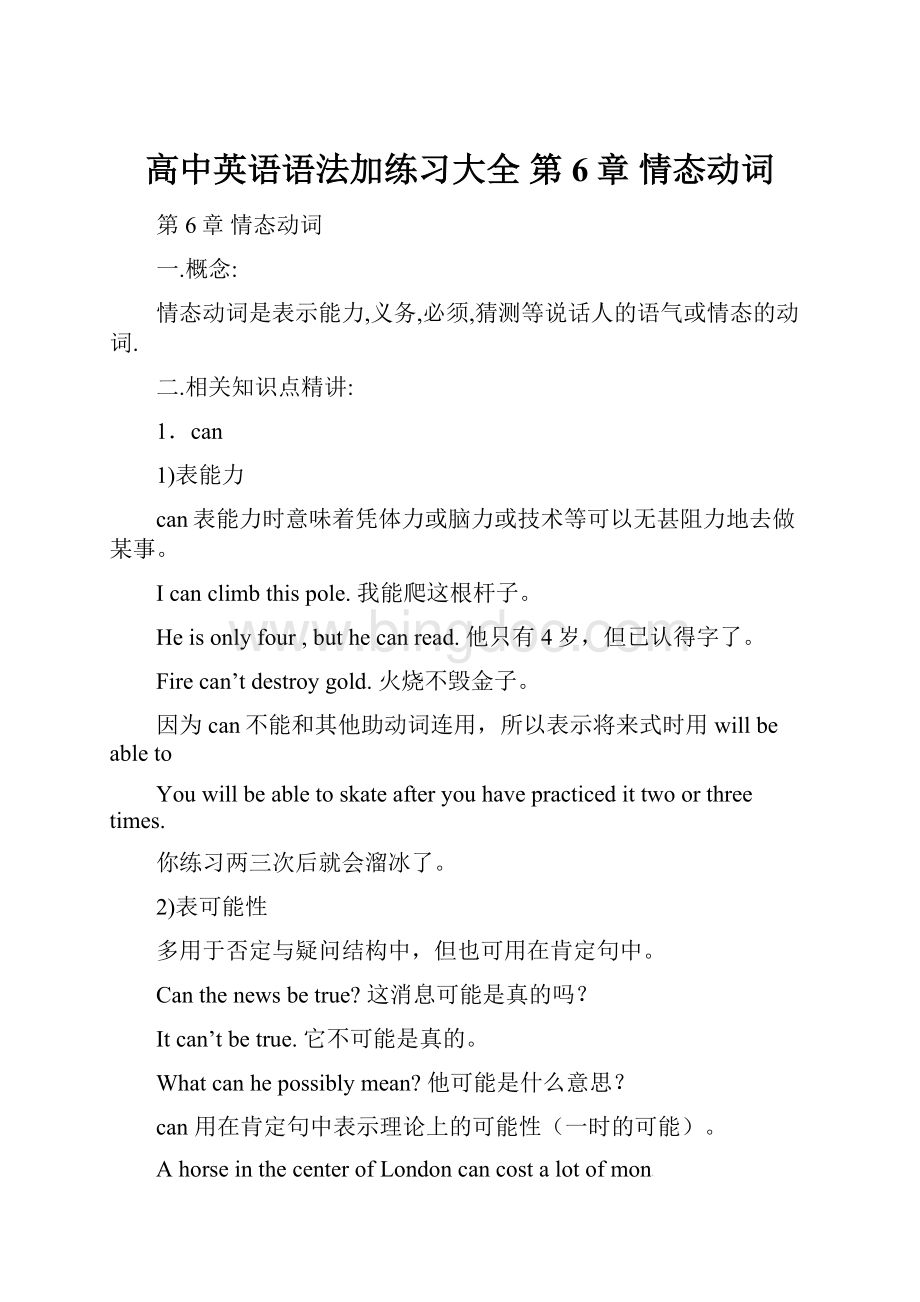高中英语语法加练习大全 第6章 情态动词.docx
《高中英语语法加练习大全 第6章 情态动词.docx》由会员分享,可在线阅读,更多相关《高中英语语法加练习大全 第6章 情态动词.docx(13页珍藏版)》请在冰点文库上搜索。

高中英语语法加练习大全第6章情态动词
第6章情态动词
一.概念:
情态动词是表示能力,义务,必须,猜测等说话人的语气或情态的动词.
二.相关知识点精讲:
1.can
1)表能力
can表能力时意味着凭体力或脑力或技术等可以无甚阻力地去做某事。
Icanclimbthispole.我能爬这根杆子。
Heisonlyfour,buthecanread.他只有4岁,但已认得字了。
Firecan’tdestroygold.火烧不毁金子。
因为can不能和其他助动词连用,所以表示将来式时用willbeableto
Youwillbeabletoskateafteryouhavepracticedittwoorthreetimes.
你练习两三次后就会溜冰了。
2)表可能性
多用于否定与疑问结构中,但也可用在肯定句中。
Canthenewsbetrue?
这消息可能是真的吗?
Itcan’tbetrue.它不可能是真的。
Whatcanhepossiblymean?
他可能是什么意思?
can用在肯定句中表示理论上的可能性(一时的可能)。
AhorseinthecenterofLondoncancostalotofmon
ey.
Attendingtheballcanbeveryexciting.
Theroadcanbeblocked.这条路可能会不通的。
may在肯定句中表示现实的可能性。
Theroadmaybeblocked.这条路可能不通了。
3)表示允许(和may意思相近)常见于口语。
Can(May)Icomein?
我能进来吗?
CanIsmokehere?
我可以在这里抽烟吗?
2.could的用法
1)表过去的可能和许可,(多用于间接引语中)
Atthattimewethoughtthestorycoul
dnotbetrue.
那时我们认为所说的事不可能是真的。
FathersaidIcouldswimintheriver.
爸爸说我可以在河里游泳。
2)表过去的能力
IcouldswimwhenIwas
onlysix.
我刚六岁就能游泳。
Could在肯定句中表示过去的能力时,常表抽象的一般的能力。
Hecouldbeverynaughtywhenhewasachild.
他小时候会是很顽皮的。
3)表“允许”。
可表示委婉客气的提出问题或陈述看法
CouldIuseyourbike?
Yes,youcan.
他会记得那时吗?
I’mafraidIcoul
dn’tgiveyouananswertoday.
恐怕我今天不能回答你。
Theteachersaidyoucouldgotothestoreforsweets.
老师说你可以去商店买糖。
3)Could/can+havedone结构表示对过去发生的事情的“怀疑”或“不肯定”。
could加完成式还用于肯定句时一般表过去可能完成而却未完成的动作。
Cantheyhavewonthebasketballmatch?
他们赢了那场篮球赛吗?
Whatyoureferredtojustnowcanhavemadeherverysad.
你刚刚所谈到的可能令他很伤心。
Youcouldhavecompletedthetaskalittleearlier.
你本来能早点完成任务的。
(但事实上并没有提前完成任务)
IcouldhavepassedmyexaminationeasilybutImadetoomanystupidmistakes.
我本可以轻易通过考试,但我犯了太多不该犯的错误。
如表具体做某一件事的能力时,则须用beableto.
Hewasabletotranslatethearticlewithoutadictionary.
他可以不用词典翻译那篇文章。
Can表示一贯的能力,beableto表示客观能力和通过努力可以达到的能力
I
can’tswim.ButIamsureIwillbeabletoswimthroughmorepracticing.
Thefirespreadthroughthehotel,buteveryonewasabletogetout
Whentheboatsankhewasabletoswimtothebank
3.may的用法
1)表示请求、可以、允许。
Youmaydrivethetractor.你可以开那台拖拉机。
2)当回答由may引起的问题时,否定答语要用mustnot,表示“不许可”、“不应该”、“不行”。
MayIcomein?
Yes,youmay.
No,youcan’t
No,youmaynot.
No,youmustn’t
No,you’dbetternot.
3)may/might推测性用法可能
Hemayberight.
Hemaynotcometoday(可能不)
Hemay/mightcometomorrow.
注意:
1只用于肯定和否定句中,不用于疑问句中。
2might比may可能性更小
Hemightgetajob.
Hemaygetajob.
3mayno可能不cannot不可能
Hemaynotcome
Hecan’tcome
3)表建议(可和aswell连用)
Youmay(might)aswellstaywhereyouare.
你还是原地待着好。
(mayaswell有“还是……的好”的含义)
4)表祝愿
Mayyoubehappy!
might
1)表过去的“可能”和“允许”多用于间接引语。
Shesaidthathemighttakeherdictionary.
她说他可以拿她的词典去用。
除在间接引语中外,might一般不表示过去的“可能”与“许可”。
表过去的“可能”可用could,表过去的“许可”可用were(was)allowedto。
2)表现在的“可能”,其可能性要比may小。
Electricironscouldbedangerous;theymightgiveyouasevereshock.
电熨斗会有危险,它可能电着人。
3)may(might)+have+done表示对过去发生行为的推测,含有“想必”、“也许是”的意思。
Itmayhavebeentrue.这事也许是真的。
Hemightnothavesettledthequestion.他可能尚未解决那个问题。
4.must的主要用法。
1)表示必须、必要
Wemustdoeverythingstepbystep.我们必须按部就班地做一切事情。
Whymustyoualwaysbotherme?
为什么你偏要打扰我呢。
2)mustbe+表语的结构,通常表示猜测,含有“一定”之意。
(只用在肯定句中)
Hemustbeanhonestboy.他一定是个诚实的男孩。
Thismustbeyourroom.这一定是你的房间。
3)must的否定式有两个:
当回答由must引起的问题时,否定答复要用needn’t或don’thaveto表示“不必”、“无须”、“用不着”、“不一定”的意义。
当表示“不应该”、“不许可”、“禁止”时,就用mustnot。
MustIgotomorrow?
明天我必须去吗?
Yes,please.是的,请吧!
No,youneedn’t.不,你不必去。
4)must+have+过去分词的结构,常用在肯定句中,表示对过去发生行为的推测,含有“一定”、“准是”的意思。
否定和疑问句用can。
ShemusthavestudiedEnglishbefore.她以前一定学过英语。
5.haveto的含义与must是很接近的,只是haveto
比较强调客观需要,must着重说明主观看法。
Imustcleantheroom.(主观想法)
Ihavetocleantheroom.(客观需要)
另外,haveto能用于更多时态:
Wehadtobethereatten.我们得在十点钟到那里。
Wewillhavetoreconsiderthewholething.
这一切我们将不得不重新加以考虑。
haveto的否定式:
don’thavetodo表示“不必做……”之意。
6.oughtto的用法
Oughtto后接动词原形,表义务,但不及must那样具有信心,如:
Youdon’t
lookwell.Yououghttogotoseethedoctor.
你气色不好,应该去看病。
Oughtto用于否定句,其否定形式可缩略为oughtn’t,如:
Yououghtn’ttosmokesomuch.你不应该抽这么多烟。
也可以用于疑问句,如:
Oughtyoutosmokesomuch?
你应该抽这样多烟吗?
Oughtto在间接引语中表过去时形式不变,如:
Hesaidyououghttotellthepolice.
他说你应该去报告警察。
7.shall的用法
1)用于第一人称征求对方的意见,如:
WhatshallIwearonthejourney?
我路上穿什么好呢?
Shallwedance?
我们跳舞好吗?
2)shall用于第二、三人称时表允诺,警告,命令,威胁(现已少见),如:
Sheshallgethershare.她可以得到她的一份。
Youshallhaveitbacktomorrow.你明天可以将它拿回。
情态动词should一般不应被认为是情态动词shall的过去式,主要用法有:
1)用于第一人称疑问句中询问对方的意愿,但语气较委婉温和,如:
Whatshouldwedonow?
我们现在该怎么办?
2)表示应该、必须,常与must换用。
例如:
Weshould(must)masteraforeignlanguageatleast.
我们应当至少掌握一门外语。
3)“should+be+表语”的结构,表示推测或惊奇。
例如:
Theyshouldbebackbynow.他们现在应该回来了吧。
Iamsorrythatsheshouldbesocareless.我感到遗憾她竟会那样粗心。
4)“should+have+过去分词”的结构,表示过去该做而实际上尚未做的动作或行为;其否定则表示发生了不应该发生的行为。
其同义结构“oughttohave+过去分词”,表示过去“早应该”、“本当”之意,语气较强。
例如:
Ishouldhavethoughtofthat.这一点我是应当想到的。
(但没想到)
Theyshouldnothaveleftsosoon.他们不应当走得这么早。
(但已走了)
5)在“Itisnatural(strange,natural,necessary,surprised,impossible,important)that……”句型中,主语从句中的谓语动词要用should+动词原形”表示“理所当然”
、“奇怪”、“必要”、“惊异”等的意思。
在lest(以免)、forfear(that)(以防)、incase(以备万一)等之后也要用should+动词原形;在advise,sugest,order,demand,request等的从句中should+do”例如:
Itisnecessarythathe(should)besentthereatonce.
有必要马上派他到那里去。
Itisstrangethatheshouldsayso.他会说这样的话真是奇怪。
Letusgoatoncelestweshouldbelateforthetrain.
我们马上走吧,以免赶不上火车。
8..will和would的用法
1)表示意志,决心或愿望。
例如:
Surelywewillsupportallthepeopleintheworldintheirstruggleforpeace.
我们一定要支持全世界人民争取和平的斗争。
Hewouldnotletmetryit. 他不肯让我去试。
2)will表示经常性、习惯性、倾向性,would表示过去的习惯行为。
Hewillsittherehourafterhourlookingatthetrafficgoby.
他会经常一连几个小时坐在那儿观看来往的车辆。
HewouldcometoseemewhenhewasinBeijing.
他在北京时,常来看望我
。
3)用于第二人称作主语的疑问句中,表示对对方的请求,would的语气比will委碗
Would/willyoukindlytellmethewa
ytothestation?
请问到火车站怎么走?
4)表可能性
Thiswillbethebookyouarelookingfor.
这可能就是你要找的书。
Sheeouldbeabout60whenshedied.
他死时大概60岁。
9.need和dare的用法
情态动词need实义动词need
现Youneed(not)doYou(don’t)needtodo
在
时Heneed(not)doHeneeds(doesn’t
need)todo
过
Youneeded(didn’tneed)todo
去
时Heneeded(didn’tneed)todo
将Youneed(not)doYouwill(not)needtodo
来
时Heneed(not)doHewill(not)needtodo
句型时态动词
情态动词dare实义动词dare
肯定句现在时dareto少用dare/darestodo
过去时dareto少用daredtodo
否定句现在时daren’t/darenotdodo/doesnotdare(to)do
过去时darednotdodidnotdare(to)do
疑问句现在时Darehedo?
Doyou/Doeshedear(to)do?
过去时Daredhedo?
Didhedare(to)do
needn’thavev-ed表示过去做了某事,但没有做的必要,意为“本没必要…”。
例如:
Youneedn’thavewakenmeup;Idon’thavetogotoworktoday
10.表推测的情态动词句子的反意疑问句
Hemust/maybeintheroom,isn’the?
Hecan’tbeintheroom,ishe?
Hemusthavefinishedthework,hasn’the?
Hemayhavedonetheworklastnight,didn’the?
:
情态动词+行为动词进行式
情态动词+行为动词进行式(即情态动词+be+v-ing形式),表示推测或评论某动作现在是否正在进行。
例如:
1)Hemustbeplayingbasketballintheroom.
2)Shemaybestayingathome.
11.情态动词+行为动词完成进行式
情态动词+行为动词完成进行式(即情态动词+havebeen+v-ing形式),表示推测或评论过去某动作是否正在进行或一直在进行。
例如:
1)Theyshouldhavebeenmeetingtodiscusstheproblem.
2)Hemay/mighthavebeenbuyingstampsinthepostofficewhenyousawhim.
12.usedto+v,beusedto+v-ing和beusedto+v
(1)usedto+v意为“过去常常”,“过去一直”;beusedto+v-ing/n(名词)意为“习惯于”;beusedto+v意为“被用来(做某事)”。
(2)usedto只表示过去,而beusedto+v-ing/n可表示现在、过去或将来。
例如:
1)Heusedtosmoke.Nowhedoesn’t.
2)He’squiteusedtohardwork/workinghard.
3)Theknifeisusedtocutbread.
13.用作情态动词的其他短语
wouldrather,wouldsooner,would(just)assoon,hadrather,hadbetter,hadsooner,cannotbut,may(just)aswell等可用作情态动词。
例如:
1)Thesoldierwouldsoonerdiethansurrender.
2)Thebravesoldierwouldassoondieasyieldtosuchane
nemy.
3)I’dratherwalkthantakeabus.
4)Ifyoudon’tliketoswim,youmayjustaswellstayathome.
注:
这些短语后一般直接跟动词原形.would(had)rather,would(had)sooner,would(just)assoon后可跟that引导的从句,that常省去,从句要用虚拟语气。
对现在和将来的假设用过去时,对过去的假设用过去完成时。
例如:
1)IwouldratheryoucameonSunday.
2)Iwouldsooneryouhadn’taskedmetospeakyesterday.
一.巩固练习:
1._____youready?
(A)Are(B)Have(C)Will(D)Can
2.____hereearly?
(A)Willhe(B)Washe(C)Didhebe(D)Werehe
3.I___happyaboutthepriceofeggs.
(A)am't(B)amnot(C)donot(D)won’t
4.SincelastyearI____himonlyonce.
(A)haveseen(B)havebeenseeing(C)see(D)wasseeing
5.Donald___sixteentomorrow.
(A)isbeing(B)goingtobe(C)shallbe(D)willbe
6.I___thestoryatall.
(A)don'tlike(B)like(C)amfondof(D)wouldlike
7.Iwouldrather___thanplaynow.
(A)tostudy(B)amstudying(C)study(D)studied
8.I'dratheryou___anythingaboutitforthetimebeing.
(A)do(B)didn'tdo(C)don't(D)didn't
9.Thecar___muchmoney.
(A)notcost(B)nothavecost(C)isn't
cost(D)didn'tcost
10.I___liketoeatfish.
(A)am(B)have(C)do(D)be
11.___repeatthequestion?
(A)ShallI(B)WillI(C)WouldyoulikethatI(D)DoyouwantthatI
12.Myteacherknowsmorethan___.
(A)myuncleknows(B)myuncledoes
(C)theyknow(D)theydon'tknow
13.He___tomeetusatthestation,butdidn'tseeus.
(A)didgo(B)didwent(C)goes(D)had
14.Notonly____uslight.
(A)doesthesungive(B)thesungives
(C)givesthesun(D)thesundoesgive
15.____youtellmewhathashappened?
(A)May(B)Must(C)Can(D)Could
16.Anne___tomorrow.
(A)cansing(B)cantosing(C)isgoingsing(D)goingtosing
17.You___handitinatonce,youmayhanditintomorrow.
(A)needn't(B)maynot(C)can't(D)mustnot
18.Telltheboythathe___intheriver.
(A)swims(B)swim(C)swimming(D)toswim
19.Joan___playonSaturday.
(A)going